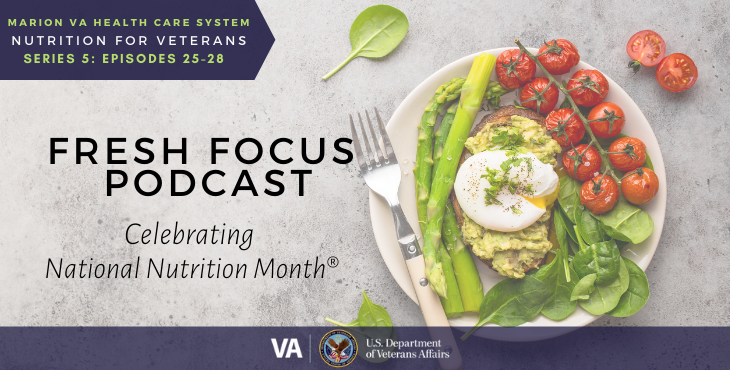In episode 28 of the Fresh Focus podcast, we continue to celebrating National Nutrition Month® by talking specifics on how to “personalize your plate” for weight loss.
There can be so much information and misinformation out there when it comes to eating for weight loss, so we brought in Registered Dietitian and Certified Specialist in Obesity and Weight Management PJ Pivec to help clear up some common myths and give you some actionable items to take away.
Pivec talks all about how weight management (and weight loss) comes down to an energy balance, including how to choose foods that not only help keep you satisfied but also can help keep volume of food up while cutting down on calories.
Some quick pro tips from the episode:
- Choose high fiber foods like fruits and vegetables.
- Choose lean proteins (if it can swim or fly, it’s a lean protein).
- Make some meals are plant-based.
- Don’t make drastic diet changes.
- You don’t need to cut out carbs to lose weight.
- Follow the healthy plate method (make ¼ of your plate protein, ¼ of your plate carbs, and ½ of your plate vegetables).
There are many different factors that go into weight loss or weight gain. Some we have control over, and some we do not. In this episode, Pivec focuses on the pieces of the weight management equation that we do have control over: food and exercise. At the same time, Pivec takes a realistic approach and recognizes that food is more than just energy – it’s also a part of life!
Listen in for an episode that will help you learn to sort through that vast amount of diet and exercise information that you may see online or that you may hear from peers. But most importantly, listen in for some easy, tangible tips that you can take away and use in your day-to-day life in order to “personalize your plate” to support healthy and sustainable weight loss.
Megan Rivenburg is a dietetic intern with the Marion VA Healthcare system.
Topics in this story
More Stories
Watch the Under Secretary for Health and a panel of experts discuss VA Health Connect tele-emergency care.
The 2024 National Veteran Suicide Prevention Annual Report provides the foundation for VA’s suicide prevention programs and initiatives.
Theranostics is a specialized field of nuclear medicine that uses a two-pronged approach to diagnose and treat cancer.







I enjoyed the Personalizing Your Plate for Weight Loss, but it seemed to focus on individuals with large appetites. I’ve been told by nutritionists that I don’t get enough caloric intake. I’m usually around 1500-1900 daily. I generally only eat once a day, and whenever I increase my water or tea intake (I do not drink any sodas), I tend to eat even less. In fact, if I feel hunger and then drink, my hunger subsides altogether. In the last 6-7 years, I have modified my diet significantly, focusing more on organic/clean eating with including more dark leafy greens. I make an effort to try and eat when I awaken, but haven’t been very successful. My junk food intake has been drastically reduced, but I still have my chips and ice cream every now and again. I do get physical activity, however, it can be sporadic at times, so I’m trying to develop a routine. Is there a blog discussing low appetites available; if not, what advice/resources can you provide?
Thank you